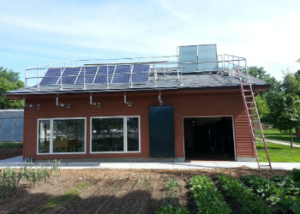Financing and Tax Credit Resources
Nebraska Department of Environment and Energy
http://www.deq.state.ne.us/NDEQProg.nsf/EnergyHome.xsphttp://www.deq.state.ne.us/
Iowa Office of Energy Independence:
https://www.iowaeda.com/iowa-energy-office/
IRS guidelines change slightly from year to year, so reviewing the current is very important. Go to www.irs.gov and search on "Solar tax credit".
Nebraska Energy Statistics
https://neo.ne.gov/programs/stats/inf/156.htm
The form for the tax credit is 5695:
http://www.irs.gov/pub/irs-pdf/f5695.pdf
Publication 4845 is an overview of solar credits:
http://www.irs.gov/pub/irs-pdf/p4845.pdf
Additional information is summarized at the DSIRE website:
http://www.dsireusa.org
Education
Build it yourself and informational links:
Nebraskans for Solar
Bold Nebraska
Nebraska Solar Energy Society
Home Power.com
Build it Solar.com
Mother Earth News
California Energy Commission
Solar Today

Metro Community College Solar Lab - Omaha, NE
This lab was designed by Solar Heat and Electric for teaching purposes.
Another 3KW hybrid system was installed at the Fort Omaha Campus using monosilicon and poly modules. These modules were designed to be interchangeable with the off-grid inverter and the grid-tie inverter.
The greatest financial incentive for Nebraska and Iowa residents interested in solar, wind and other renewable energy is the Federal tax credit. Although the 30% Federal tax credit is the largest incentive, there are additional incentives in both states for energy efficiency and low interest loans (see www.dsireusa.org for more details).
The Federal solar tax credit is due to expire December 31, 2023. Systems need to be operational by that date to be eligible. Consulting your tax advisor is highly recommended because information provided here may not be applicable to your situation.
Residential and commercial properties are eligible for a 30% tax credit with no cap, meaning no upper limit to equipment and installation.
For example, a solar system costing $10000 would have a $2600 tax credit for a net cost of $7400 (if the full credit was utilized). Commercial properties are also eligible for depreciation with recent tax changes allowing for the full amount in one year. The net result is that the solar system could be generating income from day one of operation.
The tax credit can be carried forward one year for personal use. If you can not use the full credit in one year, you can carry the balance over and use it in the following year. Commercial tax credit can be carried forward and backward. Please consult your tax advisor prior to purchasing any solar system for the latest updates. They likely will not know specific information so you can refer them to www.dsireusa.org